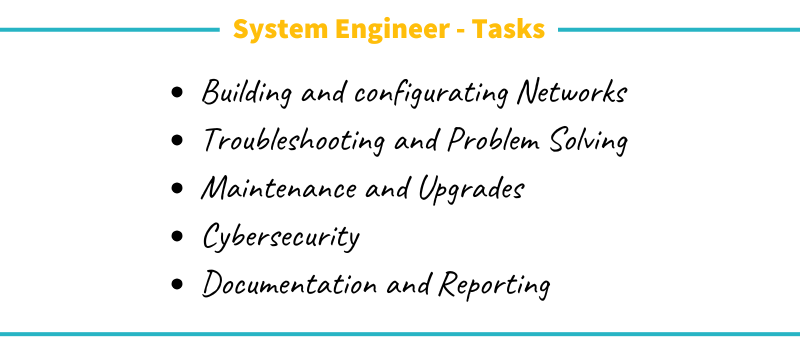If you’ve ever wondered how the internet connects us all, how your office Wi-Fi works without a hitch, or how companies protect their networks from cyber threats, you’ve indirectly encountered the work of a Network Engineer. These tech-savvy professionals are the backbone of connectivity in today’s world, ensuring that networks are efficient, secure, and running smoothly.
Curious about what it takes to be a Network Engineer, including the network engineer salary and career prospects? Let’s dive into the role, skills, and career potential in this fascinating field of network engineering.
In this article
What is Network Engineering?
Network engineering is the design, implementation, and maintenance of communication systems that enable the flow of data between devices and networks. It encompasses a wide range of technologies, from local area networks (LANs) to cloud architectures, and requires expertise in network protocols, security, and performance optimization.
What Does a Network Engineer Do?
In simple terms, a Network Engineer designs, sets up, and maintains the networks that keep businesses and individuals connected. Think of them as the architects of communication systems, ensuring that data flows seamlessly between devices.
The network engineer job description is diverse and covers a variety of tasks. Understanding what network engineers do is crucial for anyone considering this career path. Here’s an overview of the key network engineer responsibilities:
1. Building and Configuring Networks
Network Engineers are responsible for setting up the physical and virtual networks that connect devices. They design and implement network infrastructure, including switching and routing systems, to meet the unique needs of their organization or clients.
2. Troubleshooting and Problem Solving
When networks go down, Network Engineers are the first line of defense. They perform network analysis, diagnose problems, fix issues, and ensure that operations resume as quickly as possible.
3. Cybersecurity
Network Engineers take care of network security. In the event of a cyber attack, they are the first point of contact. They develop security protocols, such as firewalls and zero trust principles, to protect the integrity of the network.
4. Maintenance and Upgrades
Technology never stands still, and neither do Network Engineers. They are responsible for constant network maintenance, improving internal systems, and ensuring they meet the latest standards for future-proofing.
5. Documentation and Reporting
Keeping accurate documentation of network setups, changes, and troubleshooting processes is a vital part of the role. This ensures that no mistakes are overlooked and that the company is prepared for future events.

Where Do Network Engineers Work?
Network Engineers are needed almost everywhere. From large corporations to small startups, their expertise is essential in maintaining IT systems and network connectivity. They might work in an office environment, on-site at a client’s location, or remotely. In many cases, they are also the first point of contact for technical support for their own colleagues, which requires good communication skills.
IT network jobs are abundant across various industries. In the UK, for example, networking jobs are in high demand, with opportunities for both network engineers and network administrators.
What Skills Do You Need to Be a Network Engineer?
To work as a network engineer, you need a wide range of technical know-how. Here is an overview of essential network engineer skills:
- Network Design: Mastery of LAN, WAN, WLAN, and cloud-based networks.
- Network Architecture: Understanding of various network topologies and their applications.
- Troubleshooting: The ability to diagnose and fix problems quickly.
- Cybersecurity Expertise: Understanding protocols and tools to protect against threats.
- Familiarity with Tools: Proficiency in using network monitoring and diagnostic software.
- IP Addressing: Knowledge of IPv4 and IPv6 protocols.
- Switching and Routing: Expertise in configuring and managing network switches and routers.
- Firewall Management: Skills in setting up and maintaining firewall systems.
- Cloud Architectures: Familiarity with cloud networking principles and services.
How to Become a Network Engineer?
Education and Training
Most Network Engineers start with a network engineer degree in IT, computer science, or a related field. However, if you’ve got experience and a solid grasp of network technologies, it is also possible to break into this field without formal education. Many aspiring network professionals opt for a network engineer course or specialized network engineer training programs to gain the necessary skills.
Certifications like Cisco’s Certified Network Associate (CCNA) or Cisco’s Certified Network Professional (CCNP) are highly regarded and can open doors. These Cisco certifications are particularly valuable for those aiming to become a Cisco network engineer, a role that’s in high demand across the industry.
Career Path
The network engineer career path is diverse and offers numerous opportunities for growth. Starting as a junior Network Engineer or technician, you can move into senior roles as you gain experience. From there, you might specialize in areas like cloud networking or cybersecurity, or even transition into roles like Network Architect or IT Manager.
For those wondering how to become a network engineer, the journey typically involves:
- Obtaining relevant education or certifications.
- Gaining hands-on experience through internships or entry-level positions.
- Continuously updating skills to keep pace with evolving technologies.
- Specializing in specific areas of network engineering.
- Advancing to senior roles or management positions.
Network Engineer Salary and Job Outlook
The network engineer salary can vary depending on experience, location, and specialization. In general, network engineering is a well-compensated field with strong job prospects. In the UK, for example, salaries for network engineers are very attractive, reflecting the high demand for skilled professionals in this field.
Conclusion
The role of a Network Engineer is as challenging as it is rewarding. From designing systems that connect the world to solving critical problems and ensuring security, these professionals make a huge impact. Network engineering encompasses a wide range of responsibilities, from network configuration and optimization to network automation and performance monitoring.
Whether you’re just exploring career options or looking to specialize further in IT, Network Engineering offers endless opportunities for those willing to dive in and learn. With the increasing complexity of network infrastructure and the growing importance of network support in all industries, the demand for skilled Network Engineers continues to rise.
So why not take the first step and explore this exciting field?

